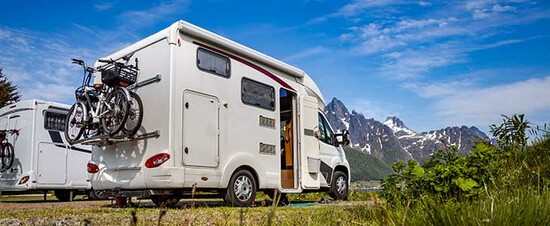When shopping for a second-hand motorhome it is important to consider all aspects such as living area size, sleeping capacity, storage space and fuel efficiency. Buyers should also ensure that the vehicle is in good condition before making any purchase decisions – checking for signs of wear and tear both inside and out – as well as ensuring that all safety features such as airbags are working correctly. It may also be worth considering additional features like insulation for cold weather camping trips and solar panels for charging up electronics when off-grid.
Thorough Inspection
Just like when you bought your home, instant impressions count for a lot. Only you know what you really like or want, so when it comes to inspecting any vehicle, think about going through the motions of, for example:
Examining the kitchen appliances to assess the quality and functionality – can everything be easily accessed? Are there sufficient cupboards and drawers for storage? Is there enough worktop space?
Testing out the beds – what is their size, comfort and support like? Additionally, consider where your bedding will be stored.
Looking into the general storage options – are they suitable for any items that you plan on taking on tour with you?
Assessing the seating areas – both for when you’re on-site and during travel.
Investigating the washroom to decide whether it is only necessary for emergencies or if it has features that make it ideal for extensive use.
Checking out the fresh- and wastewater capacities, including determining where exactly tanks are located. Also, consider your gas system; will cylinders need replacing?
Overall, make sure that you take a thorough look at every aspect of the vehicle before purchasing it to ensure that everything meets your requirements. Doing this extra bit of research ultimately will save time and money when selecting a camper van or motorhome in the long run!
Expect the Best
When buying a motorhome, it is important to consider any DIY work that may have previously been done. Doing so can help to identify any potential issues that could affect the performance of the vehicle or its reliability in the future. For example, scuffs, chips and other markings may suggest careless previous owners; holes in work surfaces, cracks in shower trays and misapplied sealants could all be signs of substandard workmanship, so it's worth taking a thorough look at these areas.
If there are any potential issues that need addressing, it's important to make sure that the dealer is willing to fix them before buying an RV. The best way to ensure this is by getting any promises made in writing with as much detail as possible. When writing up a contract or agreement outlining the promise of repairs, it's advisable to include additional facts and information as well as higher semantic richness than usual so that both parties have a clear understanding of what has been agreed upon.
Motorhome Dealership
It is not just about the sale, it is the after-sales service that you get that really matters. When looking for a motorhome dealership, it is important to look for one that has been well-established and built up specialist experience over many years. The best dealerships will have staff who are fully knowledgeable about all aspects of motorhome ownership and who can provide expert advice and guidance. Many of these dealerships will be members of the National Caravan Council's Approved Dealer Scheme, which is recognized as being a mark of high quality.
A good motorhome dealership will give you plenty of time to make your own decisions, enabling you to find the perfect motorhome or campervan that meets all your requirements. They won't push you into making any hasty decisions, allowing you to take away brochures and do further research in order to decide what's right for you. Strong customer service is another key element when selecting a dealership, as they should be able to provide assistance with maintenance issues and any other questions you may have regarding your vehicle - both before and after purchase.
Additionally, some dealerships may offer additional services such as workshops on how to use your new motorhome safely or ongoing support once it leaves the showroom floor. Many dealerships also provide accessories such as awnings and satellite systems at competitive prices, which can help enhance your camping experience even further.
Ultimately when selecting a motorhome dealership it pays to take your time researching all the options available so that you can find the perfect fit for you, ensuring a smooth and easy experience both during purchase and afterwards.
Check All Documentation
A full set of documents showing servicing records as well as any repair or warranty work, plus any added accessories, is a great indication of caring, previous owners. This can give you an idea of the level of care that has been provided to the motorhome, providing peace of mind when it comes time to purchase. While most people don’t have the technical know-how to assess its overall condition, they can get a good understanding of what sort of maintenance has been done and how often.
It’s also important to ask about a test drive before signing on the dotted line. While this may seem daunting for new drivers who are unaccustomed to handling larger vehicles, it’s essential for getting a feel for how the motorhome drives and handles. It’s important to pay attention during the drive and look out for any unexpected noises from inside the living area that could indicate potential problems down the road. Additionally, you should check your driving license to make sure you are legally allowed to drive a vehicle of that size.
Once you’ve made your decision and purchased your motorhome, don’t forget about a specialist motorhome insurance policy – an absolute must in order to protect yourself and your investment. Motorhome insurance policies can be tailored specifically for you based on your needs and circumstances, some may offer additional coverage such as breakdown assistance and replacement caravan equipment while others may provide discounts if safety devices such as wheel clamps are installed on the vehicle. Whatever type of policy you choose, make sure that it offers sufficient protection so that if something was ever to happen whilst out on a journey, you would be covered financially.


Comments
There are no comments yet. Login or Register and write an article comment